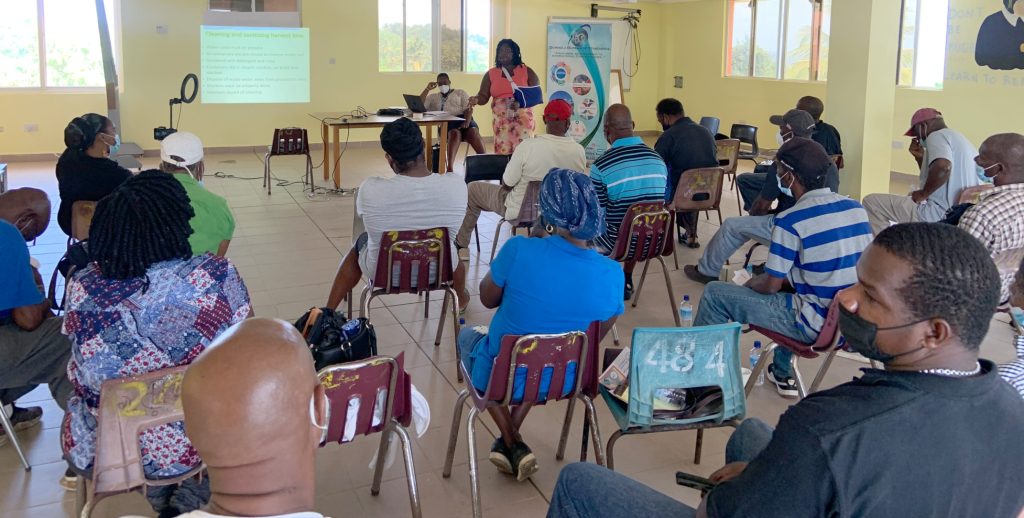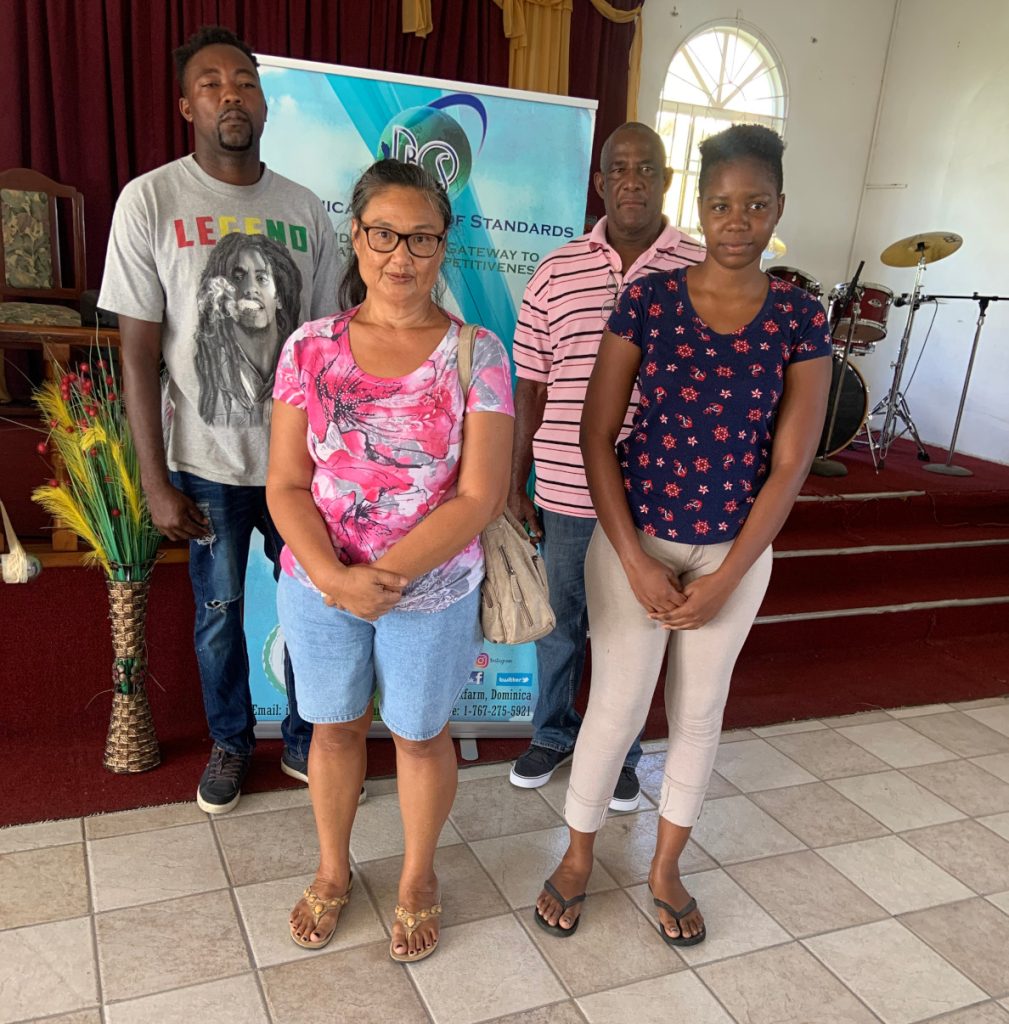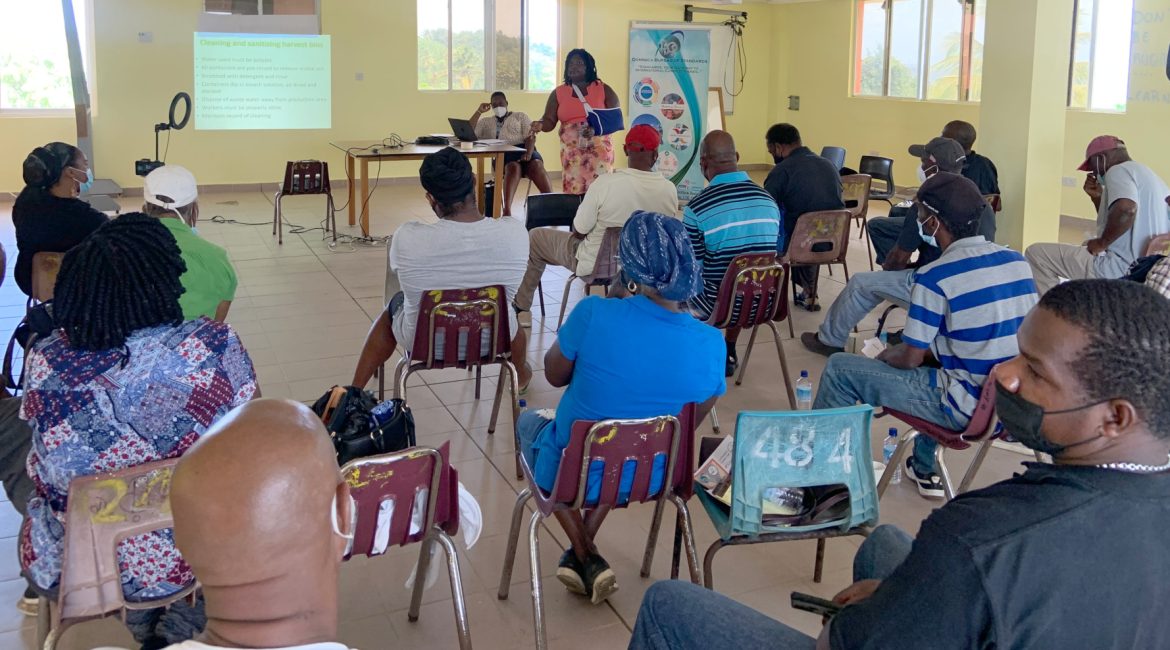The Inspection Unit of the Dominica Bureau of Standards (DBOS) has continued training for farmers under the Dominica Good Agricultural Practices (DOM-GAP) Programme.
DOM-GAP is a farm certification programme that targets all commercial farmers involved in the cultivation of fresh produce for local and export markets. The goal is to ensure that commodities are produced in adherence to international best practices and guidelines. It provides the assurance that the commodities are suitable for human consumption, which, as a result, increases consumer confidence in Dominica’s fresh produce and further enhances farmers’ competitive edge in the marketplace.
On Thursday, March 10th, and Wednesday, March 30th, 2022 trainings were conducted in the areas of first aid, food safety, and pesticide management for farmers of the north east and west agricultural regions of Dominica. The trainings were a collaborative effort with the Fire and Ambulance Service, the Environmental Health Department, and the Division of Agriculture. They will enable Dominica’s fresh produce to become internationally competitive through the adoption of Good Agricultural Practices and will result in improved yield and quality of fresh produce, as well as the health and safety of agricultural workers.

Mr. Carlbeng Etinoffe, Ms. Rose-Annette Peltier, as well as Mr. Chris Cadette represented the Fire and Ambulance Service, and delivered presentations on first aid. They detailed the various types of injuries which could occur on the farm – from heavy bleeds to fractures and the emergency care required. In addition, they displayed to the farmers some of the items which should be included in their First Aid Kit. Through the use of a volunteer, they demonstrated how items from the First Aid Kit can be used in the event of a broken arm.
Ms. Kursha Augustine of the Environmental Health Department conducted the Food Safety Training and shared ways in which products could become contaminated. The incidence of food-borne illnesses, as well as the importance of toilet facilities on the farm, were also discussed. Ms. Augustine urged farmers to take their health seriously and referenced a report of an outbreak of Leptospirosis between 2015 and 2017. Thirty (30) cases were reported, of which 18% were farmers. Interestingly, during the reported period, all fatalities were farmers.
In the final sessions, Mr. Hilroy Alfred and Mr. Jefferson Francis from the Division of Agriculture presented on the safe use of pesticides which included information on the types of pests and pesticides suitable for controlling them. They noted, for example, that fungicide is classified as a pesticide since fungi are considered pests. However, fungicides are solely for the treatment of fungi, and they reiterated that pesticides should not be intermixed.
Emphasis was also placed on the importance of reading labels, particularly about storage and handling of chemicals. The presenters elaborated on the use of personal protective clothing and equipment when applying chemicals. They further advised farmers that when pesticides are not stored in their original containers (for example in jerrycans) these containers should be properly labeled with permanent markers.
The first training was held at the North East Comprehensive Secondary School in Londonderry, for farmers of the northeast region, followed by farmers of the west at the Christian Assembly Ministry Church in Salisbury. A diverse group of participants attended the training sessions and gave testimonials on how the programme has assisted them. Here are some below:

Ms. Connie Joy Telemacque, a farmer from Wesley in her feedback on the Training, said the Dominica Bureau of Standards has been working hard to get farmers certified.
“They are really working hard for farmers to be certified, really hard and I applaud them for that, especially the field officers, because we cannot do it on our own as farmers. So with their help, they can assist us a lot in doing that.”
Ms. Joyanne Williams, a youth in Agriculture who is pursuing an associate degree in agriculture at the Dominica State College, expressed that she has always had a passion for agriculture and would like to see her country develop sustainable and good farming practices.
She said, “What really stayed with me today is what farmers need to do on the farm in case of an emergency or an accident on the farm, and the measures which should be taken to treat it before arriving at a medical facility”.
The Director of the Dominica Bureau of Standards, Mr. Median LaRocque in his closing remarks said, the Bureau is taking the training of farmers very seriously. He stated though that it was not only about the competitive edge that the farmers are expected to get in the marketplace.
He said, “It is about you, your safety, your workers’ safety, and the environment that you are working in”.
He encouraged the farmers to implement what they have learnt at the training sessions. Ms. Keisha Joseph, Technical Officer for Quality in the Inspection Unit, thanked the farmers for taking the time out from their busy schedules to participate and gain knowledge.
The Inspection Unit is scheduled to host more training in first aid, food safety, and pesticide management for DOM-GAP farmers, in the other agricultural regions. The Unit also hopes to host these training sessions in the creole language for a wide range of Haitian national farmers.





